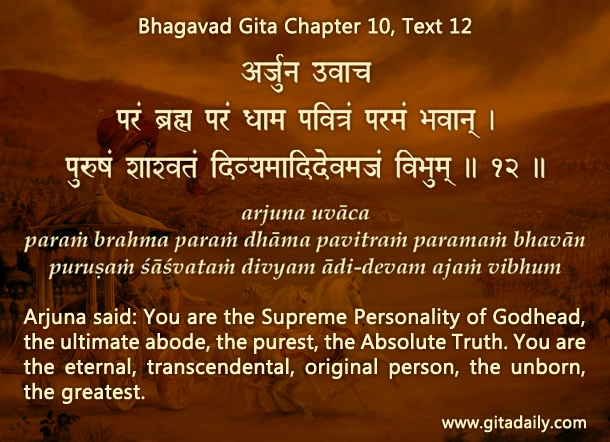Suppose a celebrated professor discussed a controversial subject during a class — and that discussion is available for posterity through a transcript. If different people interpret that class in different ways and if that professor is no longer accessible, where might we turn for an authorized understanding? Maybe the transcript itself could be a source, especially if the class was actually a discussion with just one student and if its transcript contained the student’s words, wherein they share their understanding of the professor’s explanation. Those words would be valuable, even vital, indicators of the professor’s central message.
Similarly, significant are Arjuna’s words in the Gita. Given that the Gita is a discussion between him and Krishna — a discussion that has been interpreted in many differing, even opposing ways, his words are crucial clues to its correct understanding. Consider, for example, Arjuna’s declaration that Krishna is the highest reality (10.12-15). Krishna doesn’t interrupt or correct Arjuna, thereby indicating that he accepts Arjuna’s understanding. When Arjuna follows up this declaration with a request to hear more about Krishna’s glories (10.16-18), Krishna doesn’t chide him for wandering off to a minor or tangential subject. Instead, Krishna expresses his pleasure, as indicated by his use of hanta (10.19), which is often an exclamation, an expression of wonder. In this verse’s context, hanta broadly means, “Yes, certainly! I will speak with pleasure.”
Thus, even for those who don’t consider Arjuna an authority on spiritual subjects, his words in the Gita can still be robust indicators of its core meaning. Why? Because his words are spoken in the presence of the supreme authority, the person who knows the Gita’s message the best, the person who is the source of that message: Krishna himself.
One-sentence summary:
In the Bhagavad-gita’s narrative structure, Arjuna is not just a student; he is also a reliable pointer to its central message.
Think it over:
- For understanding the Gita’s central message, why are Arjuna’s words so important?
- Even for those who don’t consider Arjuna an authority, why can his words still be considered authoritative?
- Explain with an example how Arjuna’s words point to the Gita’s core teachings.
***
10.12: You are the Supreme Personality of Godhead, the ultimate abode, the purest, the Absolute Truth. You are the eternal, transcendental, original person, the unborn, the greatest.
To know more about this verse, please click on the image


I don`t understand how can one not consider Arjuna an authority, when he is in direct contact with the Supreme Personality of Godhead and through his words – questions – we learn Gita’s message?
Entirely on the other hand, it is as if we do not trust Prahlada Maharaja about Nrsimhadeva…?
arjuna is disciple of Krishna
nice please keep it up